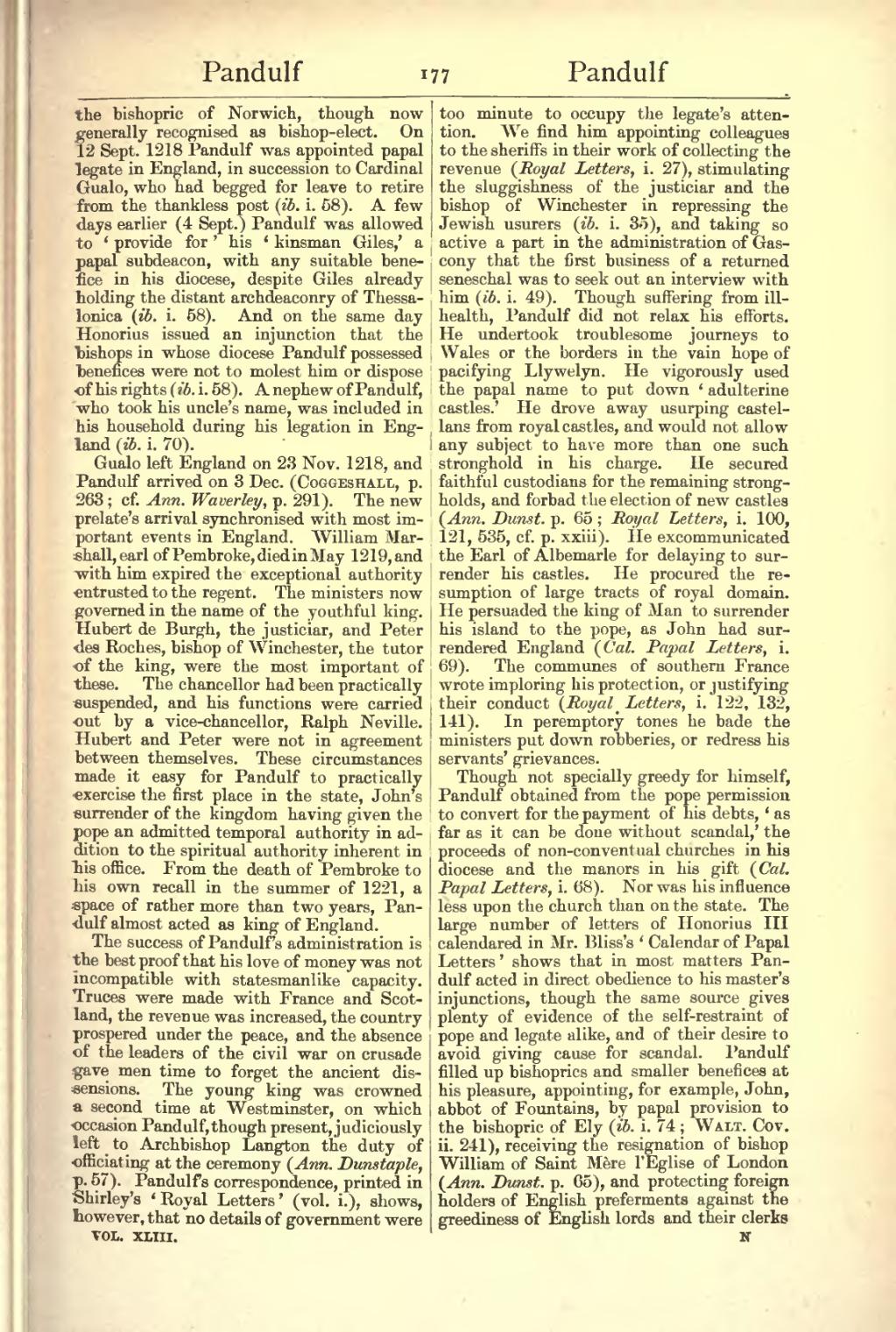the bishopric of Norwich, though now generally recognised as bishop-elect. On 12 Sept. 1218 Pandulf was appointed papal legate in England, in succession to Cardinal Gualo, who had begged for leave to retire from the thankless post (ib. i. 58). A few days earlier (4 Sept.) Pandulf was allowed to ‘provide for’ his ‘kinsman Giles,’ a papal subdeacon, with any suitable benefice in his diocese, despite Giles already holding the distant archdeaconry of Thessalonica (ib. i. 58). And on the same day Honorius issued an injunction that the bishops in whose diocese Pandulf possessed benefices were not to molest him or dispose of his rights (ib. i. 58). A nephew of Pandulf, who took his uncle's name, was included in his household during his legation in England (ib. i. 70).
Gualo left England on 23 Nov. 1218, and Pandulf arrived on 3 Dec. (Coggeshall, p. 263; cf. Ann. Waverley, p. 291). The new prelate's arrival synchronised with most important events in England. William Marshall, earl of Pembroke, died in May 1219, and with him expired the exceptional authority entrusted to the regent. The ministers now governed in the name of the youthful king. Hubert de Burgh, the justiciar, and Peter des Roches, bishop of Winchester, the tutor of the king, were the most important of these. The chancellor had been practically suspended, and his functions were carried out by a vice-chancellor, Ralph Neville. Hubert and Peter were not in agreement between themselves. These circumstances made it easy for Pandulf to practically exercise the first place in the state, John's surrender of the kingdom having given the pope an admitted temporal authority in addition to the spiritual authority inherent in his office. From the death of Pembroke to his own recall in the summer of 1221, a space of rather more than two years, Pandulf almost acted as king of England.
The success of Pandulf's administration is the best proof that his love of money was not incompatible with statesmanlike capacity. Truces were made with France and Scotland, the revenue was increased, the country prospered under the peace, and the absence of the leaders of the civil war on crusade gave men time to forget the ancient dissensions. The young king was crowned a second time at Westminster, on which occasion Pandulf, though present, judiciously left to Archbishop Langton the duty of officiating at the ceremony (Ann. Dunstaple, p. 57). Pandulf's correspondence, printed in Shirley's ‘Royal Letters’ (vol. i.), shows, however, that no details of government were too minute to occupy the legate's attention. We find him appointing colleagues to the sheriffs in their work of collecting the revenue (Royal Letters, i. 27), stimulating the sluggishness of the justiciar and the bishop of Winchester in repressing the Jewish usurers (ib. i. 35), and taking so active a part in the administration of Gascony that the first business of a returned seneschal was to seek out an interview with him (ib. i. 49). Though suffering from ill-health, Pandulf did not relax his efforts. He undertook troublesome journeys to Wales or the borders in the vain hope of pacifying Llywelyn. He vigorously used the papal name to put down ‘adulterine castles.’ He drove away usurping castellans from royal castles, and would not allow any subject to have more than one such stronghold in his charge. He secured faithful custodians for the remaining strongholds, and forbad the election of new castles (Ann. Dunst. p. 65; Royal Letters, i. 100, 121, 535, cf. p. xxiii). He excommunicated the Earl of Albemarle for delaying to surrender his castles. He procured the resumption of large tracts of royal domain. He persuaded the king of Man to surrender his island to the pope, as John had surrendered England (Cal. Papal Letters, i. 69). The communes of southern France wrote imploring his protection, or justifying their conduct (Royal Letters, i. 122, 132, 141). In peremptory tones he bade the ministers put down robberies, or redress his servants' grievances.
Though not specially greedy for himself, Pandulf obtained from the pope permission to convert for the payment of his debts, ‘as far as it can be done without scandal,’ the proceeds of non-conventual churches in his diocese and the manors in his gift (Cal. Papal Letters, i. 68). Nor was his influence less upon the church than on the state. The large number of letters of Honorius III calendared in Mr. Bliss's ‘Calendar of Papal Letters’ shows that in most matters Pandulf acted in direct obedience to his master's injunctions, though the same source gives plenty of evidence of the self-restraint of pope and legate alike, and of their desire to avoid giving cause for scandal. Pandulf filled up bishoprics and smaller benefices at his pleasure, appointing, for example, John, abbot of Fountains, by papal provision to the bishopric of Ely (ib. i. 74; Walt. Cov. ii. 241), receiving the resignation of bishop William of Saint Mère l'Eglise of London (Ann. Dunst. p. 65), and protecting foreign holders of English preferments against the greediness of English lords and their clerks

